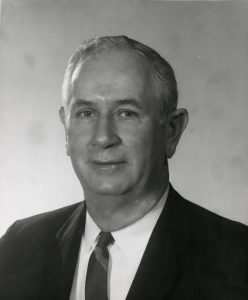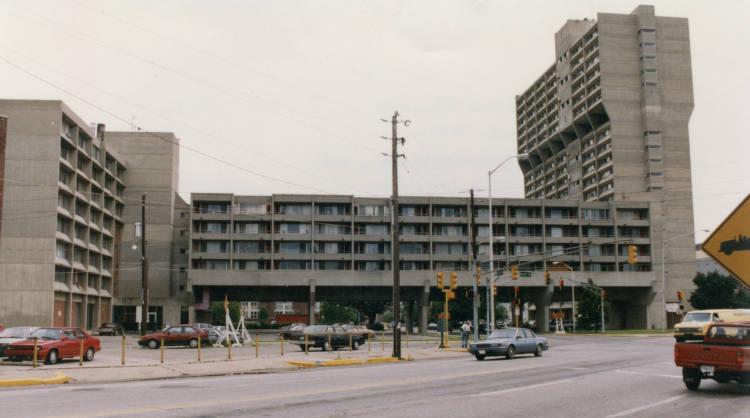
Photo info ...
(June 23, 1906-May 4, 2004). The son of Irish immigrants Patrick and Nora Prendergast Barton, John J. Barton was born in Indianapolis. He graduated from Cathedral High School and earned an engineering degree from Purdue University in 1930.
Barton served in the U.S. Navy during World War II and afterward joined the Indiana State Police. In 1961, after a three-year absence from the department spent working for a manufacturing company, he was appointed superintendent of the State Police by Governor Matthew Welsh, serving in this position from 1961 to 1963.
Barton’s reputation for honesty earned during the years he worked with the State Police, helped him win the 1963 mayoral election. A political novice, he won the heated Democratic primary and defeated Republican Clarence Drayer and Independent candidate Samuel Unger in an election noted for its record voter participation. Barton campaigned on a platform that included promises to reform the troubled , to involve the community in decision making, to seek federal assistance for the city whenever possible, clear slums, and repair infrastructure. He served as mayor from 1964 through 1967.
Barton made the police department his first priority. The force had been racked the previous year by a series of bribery charges involving more than 27 officers. The mayor named Noel Jones, a tough disciplinarian, as chief of police. Jones reorganized the department, placing Vice Operations back under the uniformed division and cracking down on corruption. Barton cited the reorganization of the police department as one of his best achievements but lamented that the General Assembly refused to authorize the stronger merit system he advocated.
In a break with his predecessors, Barton actively sought federal aid for municipal needs. He reactivated the and used federal funds to create low-income housing for people displaced by the interstate highway system and slum clearance projects.

By the end of Barton’s term in office, the city had completed a large portion of the planned 3,000 units. The mayor also led Indianapolis to participate in the program, instituted a Community Action Against Poverty program (), and successfully lobbied the General Assembly to allow the city to receive federal matching funds for its urban renewal projects.
Barton also completed several projects that had languished under previous administrations. He pushed for the completion of , a downtown convention center, and a westside Indiana University campus. Both the and what was to become fit within his plans for urban renewal and his desire to attract businesses to Indianapolis. Eagle Creek Park and Reservoir were created to alleviate the flooding on the west side of the city and also to fill the need for more park and leisure space in Indianapolis.
The Barton administration also changed the road system in the city to include more one-way streets and wider lanes. These improvements earned the city three national safety awards in 1966, including one naming it the “safest city in the United States.”
The most lasting legacies of the Barton administration were the creation of the citizens’ advisory committee known as the (GIPC) in 1965 and the increased centralization of authority in Marion County. Barton advocated closer working relations and possible consolidation between city and county authorities that had overlapping jurisdictions. He hoped to give the mayor more control over municipal operations so that his, as well as future administrations, could actually make policy changes immediately. Most of the bills allowing for such control failed to pass in the General Assembly during his tenure but passed in 1969 in the form of the legislation creating .
GIPC proved to be the major force behind the development of Indianapolis under Barton. During Barton’s term GIPC recommended a large park, development of expressways, better architecture, a downtown civic center, a capital improvement program, the fostering of racial integration, and intercity sports competition. Barton used GIPC recommendations and called the committee one of his greatest achievements, an assessment shared by his successors.
Despite these accomplishments he could claim, Barton lost the 1967 mayoral election to Republican in what many believed to be a protest vote against the national administration of President Lyndon Johnson. Governor Roger Branigin appointed Barton to the Indiana Parole Board in January 1968, where he continued in public service until retiring in September 1989.
Barton died in Indianapolis and is buried in Calvary Cemetery.
CITE THIS ENTRY
APA:
Sample, B. W. (2024). John J. Barton. Encyclopedia of Indianapolis. Retrieved Mar 5, 2026, from https://indyencyclopedia.org/john-j-barton/.
MLA:
Sample, Bradford W. “John J. Barton.” Encyclopedia of Indianapolis, 2024, https://indyencyclopedia.org/john-j-barton/. Accessed 5 Mar 2026.
Chicago:
Sample, Bradford W. “John J. Barton.” Encyclopedia of Indianapolis, 2024. Accessed Mar 5, 2026. https://indyencyclopedia.org/john-j-barton/.

Help improve this entry
Contribute information, offer corrections, suggest images.
You can also recommend new entries related to this topic.